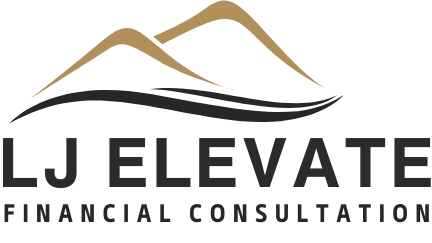How Much Do I Need to Retire Comfortably? A Complete Guide
Retirement planning often begins with one fundamental question: How much do I need to retire comfortably? While there’s no one-size-fits-all answer, understanding the key components of retirement planning can help you arrive at the right number for your unique situation.

At LJ Elevate, we help individuals and small business owners achieve financial wellness. In this comprehensive guide, we’ll break down the factors that determine your retirement number, the tools to calculate it, and the actionable steps to make it achievable.
What Does “Retiring Comfortably” Really Mean?
Retiring comfortably means having enough money to maintain your desired lifestyle without worrying about running out of savings. That includes:
- Covering your living expenses
- Paying for healthcare
- Traveling and pursuing hobbies
- Leaving a legacy for your family
To determine your comfortable retirement, start by defining what comfort means for you. Everyone’s retirement dream is different.
The Rule of Thumb: 70%–80% of Pre-Retirement Income

Financial advisors often recommend planning for 70% to 80% of your pre-retirement income. This assumes you’ll spend less on work-related expenses but still want to enjoy life.
Example: If you earn $100,000 annually before retirement, aim for $70,000–$80,000 per year during retirement.
Multiply that by your estimated years in retirement—typically 20 to 30 years—and you’ll get a rough target savings number. But there’s much more to consider.
Key Factors That Affect How Much You Need
1. Your Desired Retirement Age
The earlier you retire, the more you’ll need. A longer retirement period means more years of living expenses to cover.
2. Expected Lifespan
With increasing life expectancy, it’s safer to plan for a retirement that lasts into your 90s.
3. Health and Medical Expenses
Healthcare is one of the largest costs in retirement. Factor in premiums, co-pays, and long-term care. Consider opening a Health Savings Account (HSA) as a tax-efficient way to prepare.
4. Inflation
A dollar today won’t be worth the same 20 years from now. Use a conservative estimate of 2–3% annual inflation in your projections.
5. Location
Where you retire impacts your cost of living—housing, taxes, and healthcare vary by state or country.
How to Calculate Your Retirement Number

There are several methods to calculate how much you need. Here are two of the most popular:
Method 1: Multiply Your Annual Need by 25
Known as the “25x rule,” this approach uses a safe withdrawal rate of 4%.
Example: If you need $60,000/year, multiply by 25 = $1.5 million.
Method 2: Use a Retirement Calculator
Online calculators can personalize the estimate based on:
- Age
- Income
- Savings
- Lifestyle goals
Explore our detailed Retirement Plans page to start planning with real numbers.
Retirement Income Sources to Consider
1. 401(k) or Solo 401(k)
Tax-deferred retirement savings for employees or self-employed individuals. If you’re a business owner, check out our Investment Plans for the best options.
2. IRAs (Traditional and Roth)
Essential accounts for long-term retirement savings. Roth IRAs offer tax-free withdrawals.
3. Social Security
The average Social Security benefit is around $1,800/month (as of 2025). Not enough alone but a useful supplement.
4. Annuities and Pensions
Annuities provide guaranteed income streams. Pensions are rare but valuable.
5. Investments and Real Estate
Diversified portfolios of stocks, bonds, and rental properties can generate income and build wealth.
Learn more on our Investment Plans page.
Strategies to Boost Your Retirement Savings
1. Start Saving Early and Consistently
The sooner you start, the more time your money has to grow through compound interest.
Explore: Best Ways to Save for Retirement
2. Max Out Tax-Advantaged Accounts
Maximize contributions to 401(k)s, IRAs, and HSAs. If over 50, use catch-up contributions.
3. Diversify Your Portfolio
Don’t rely solely on one asset class. Spread your investments to minimize risk and increase potential returns.
4. Consider Insurance to Protect Your Wealth
Unexpected events can derail your retirement. Get coverage for life, disability, and long-term care.
Read: Best Insurance Plans for Families
5. Minimize Taxes in Retirement
Plan how and when to withdraw from taxable, tax-deferred, and tax-free accounts. Learn to time your income and expenses wisely.
Explore: Reduce Taxes in Retirement Strategies
Adjusting Your Plan Based on Life Changes
Life is unpredictable. Reassess your plan every 1–2 years or after major life events:
- Job change
- Marriage or divorce
- Health issues
- Market downturns
Being proactive helps you stay on track.
Case Study: Retiring Comfortably as a Small Business Owner

Robert, 45, Boutique Owner
- Annual income: $100,000
- Current retirement savings: $150,000
- Goal: Retire at 65 with $70,000/year
Using diversified IRAs, a SEP IRA, and rental property income, Robert increases his savings rate to 20% annually. With strategic investing and catch-up contributions after 50, he’s projected to hit his target by age 65.
What If You’re Starting Late?
Starting late isn’t a deal-breaker. Here’s how to catch up:
- Cut expenses and boost savings rate
- Delay retirement by a few years
- Leverage Retirement Plans designed for accelerated growth
- Reduce debt to free up cash
Also read: Best Retirement Plans for Seniors
How LJ Elevate Can Help You Retire Comfortably
At LJ Elevate, we provide:
- Personalized retirement planning for small business owners
- Resources on insurance and investment strategies
- Blogs packed with financial wellness advice
Your retirement dream is possible with the right tools, education, and support.
Final Thoughts
The question isn’t just how much do I need to retire comfortably?—it’s how do I get there? With a clear plan, consistent savings, and professional guidance, a comfortable retirement is well within reach.
Start planning your future today with LJ Elevate.







